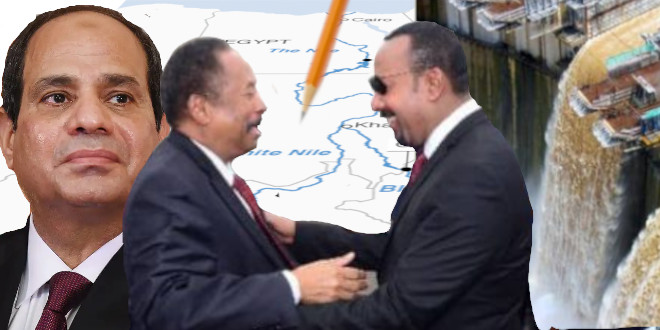Addis Abeba 2011: It’s 2002 All Over Again
 Addis Abeba, 2002. The Eritrean alliance of opposition organizations is discussing the fate of the Eritrean Liberation Front-Revolutionary Council (ELF-RC), which had been split into two wings. One wing, led by the late Seyoum Ogbamichael, stages a walk-out: subsequently, in the bitterness and recriminations that ensue after the split, the Seyoum Ogbamichael-led ELF-RC, describes the Alliance as an organization composed of inept ethnicists and regionalist ready and willing to sacrifice Eritrean sovereignty. The ELF-RC pledges to create a better and more effective Alliance.
Addis Abeba, 2002. The Eritrean alliance of opposition organizations is discussing the fate of the Eritrean Liberation Front-Revolutionary Council (ELF-RC), which had been split into two wings. One wing, led by the late Seyoum Ogbamichael, stages a walk-out: subsequently, in the bitterness and recriminations that ensue after the split, the Seyoum Ogbamichael-led ELF-RC, describes the Alliance as an organization composed of inept ethnicists and regionalist ready and willing to sacrifice Eritrean sovereignty. The ELF-RC pledges to create a better and more effective Alliance.
Meanwhile, in one of his many feuds, Isaias Afwerki the Eritrean dictator decides to suspend his membership in the African Union.
Addis Abeba, 2011. The Eritrean Democratic Alliance (EDA) member opposition organization are discussing the fate of the Eritrean People’s Democratic Party (EPDP), which is what the ELF-RC ended up becoming after joining up with the Eritrean Democratic Party (EDP) and the Eritrean People’s Movement (EPM.) EPDP announced on Sunday, January 23, 2011, that it has withdrawn its membership from the alliance. As of the writing of this editorial, there is no word from the EDA, but it is clear that its members had discussed the fate of EPDP within the EDA.
Meanwhile, in one of his many lose-a-foot, gain-an-inch strategies, Isaias Afwerki, the Eritrean dictator, has decided to reinstate Eritrea’s representation to the African Union and has nominated the compulsive liar Girma Asmerom as his representative.
The Eritrean opposition alliance has spent the last nine years going in circles and the Eritrean dictator has spent the last nine years going back and forth; and Eritrea has not inched forward.
The Future Of The Eritrean Opposition
In principle, there is nothing new in joining or withdrawing from the Alliance. Over the past five years alone, organizations led by Herui T Bairou, Berhane Hanjema, Abdella Adem and others have withdrawn (voluntarily or involuntarily), and in 2007, the alliance was split into two for a year only to come together again. This new development should not be seen as a case of hurt feelings or misunderstanding: their separations and disagreements are based on fundamental differences in outlook: on how to wage the struggle for change and what to institute once the dictatorship falls.
The EPDP says it believes in bringing about a non-violent change: one that uses civil disobedience and resistance to challenge the decaying PFDJ. It believes in de-emphasizing ethnic and regional identities in favor of national identity. And it says it believes in creating a secular and decentralized-but-unitary state.
The prevailing view in the EDA is one that espouses a “by any means necessary” change: one that is unabashed of the need to use military means, when necessary, to bring change about. The prevailing view within the rest of the EDA is one that is highly deferential to other identities beside the national—including ethnic, religious and regional. It is a view that stresses the creation of a Federal state where power is devolved to localities.
The worst thing that can happen now is to waste precious energy trying to reconcile the EPDP and the EDA. Actually, make that the second worst thing: the worst thing that can happen now is for those involved to focus all their animosity against each other, narrating and retelling their versions in “public meetings” and press releases. Just let it go: everybody knows where everyone stands; now show us, in deeds, how your formula actually works in reducing, if not eliminating, the misery of the Eritrean people. The struggle should not be limited to Internet chat and propaganda warfare against each other; political organizations should not be limited to only running propaganda outlets. One more thing: if there are organizations within the EDA whose vision is more aligned with the EPDP, or if there are members within the EPDP whose vision is more aligned with the EDA, now is the time for them to make their move. Eritreans have had 9 years of the damaging politics of stalling and of tripping: it is time for real change. And the few civic organizations and individuals who try hard to appear non-partisan can now throw their veils and join the organization of their choice—that will decrease much of the confusing Eritrean political cyber decibels. It is time to focus on delivery.
Eritrea And The African Union
The United Nations recognized Eritrea as the 193rd country in May 1993, shortly after it held its statehood referendum in April 1993. In June 1993, the African Union (then the Organization of African Unity or OAU), accepted Eritrea’s membership. In his inaugural address to the heads of states of the African Union, the Eritrean tyrant, Isaias Afwerki, began his long journey of heaping insult on the regional organization and generally complaining of its worthlessness.
Between 1993 and now, Isaias Afwerki has been on the opposite side of every winning argument within the AU. He has been sympathetic to his fellow mad man, Libya’s Muammar Kadaffi, and his proposal to move the capital of the African Union from Addis Abeba to Tripoli. When all of Africa gave its support to Somalia’s Transitional Federal Government, Isaias Afwerki was against it. When all of Africa gave its support to the Djibouti agreement to reconcile and consolidate the Somalia government, he was against it. When all of Africa called on him to accept mediation talks with Djibouti, he was against it. In 2002, he withdrew his representation from the OAU and the East African association Intergovernmental Authority on Development (IGAD.)
In 2010, under pressure from his financier and benefactor, Qatar’s Amir, he accepted a peace proposal to settle Eritrea’s border dispute with Djibouti: a dispute he initiated and spent a whole year denying it existed and rejecting proposals to settle it. Now, he has agreed—most likely under pressure from Qatar but also with a considerable Norwegian influence—to rejoin the African Union so that he can have a presence in Ethiopia.
Fittingly, the representative he has chosen for the task is Girma Asmerom, a man who has developed a well-earned reputation for being a compulsive liar. Girma Asmerom is the same man who was vehemently arguing in November 2001 that elections would be held in Eritrea in December 2001. This is the same Girma Asmerom who, as Eritrean ambassador to the United States, told Aster Yohannes–wife of incarcerated G-15 member Petros Solomon who was attending school in the United States–that he would personally guarantee her safety if she returned to Eritrea: she did on December 11, 2003 and she was whisked away from the airport straight to prison, before she could kiss her children who were waiting for her at the airport with roses. She still languishes in prison.
Girma Asmerom is the same man who, as Eritrean ambassador to the United States, was busy spouting his hate speech to any American official who would listen that every Eritrean opposition figure is a Jihadist. This same Girma Asmerom,who now talks big about his regime does not beg for US military base and condemning US intervention, was the same one who told the Japanese paper Yomiuri Shimbun (report filed on July 5, 2002) the following: “We are perfect for America; we have deepwater ports for its navy, mountains very similar to those in Afghanistan that can be used for training purposes and airfields that can accommodate its aircraft.” Girma lobbied hard to have the United States base its African counter-terrorism operations in Eritrea because Eritrea’s mountains look like those in Afghanistan. The US chose Djibouti, one of the reasons why Isaias hates that country.
This is the same Girma Asmerom who, in August 2009, told EU Commissioner Louis Michel—who said that he would only visit Eritrea if he could bring Swede-Eritrean journalist Dawit Isaak back from Eritrea—that of course, he gives him his personal reassurance that that would happen. The EU Commissioner returned empty-handed.
This is the same Girma Asmerom who also promised Eva-Britt Svensson, the European Union parliamentarian, that his government would formally charge Isaac, a promise that later Girma Asmerom’s embassy denied.
So Lij Girma Asmerom will be in Addis Abeba doing what he does best—lying—until the Eritrean dictator does yet another whimsical decision and withdraws him. And AU diplomats will find it difficult to separate lies from truth in whatever Girma says. Meanwhile, we won’t be surprised if the Ethiopian government restricts his movement within a 2 kilometer radius from the headquarters of the AU, just as the US has found it necessary to restrict the movement of Isaias’ messenger boys to Washington, DC.




Awate Forum